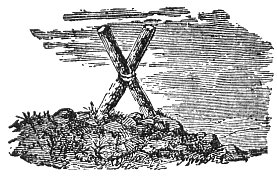in opposition to the Fullness, [Πλήρωμα . . . . Ple_roma] of the Divine Life; or as the shadow that accompanies the light; or as the chaos, or the sluggish, stagnant, dark water. This matter, dead in itself, possesses by its own nature no inherent tendency; as life of every sort is foreign to it, itself makes no encroachment on the Divine. As, however, the evolutions of the Divine Life (the essences developing themselves out of the progressive emanation) become feebler, the further they are removed from the first link in the series; and as their connection with the first becomes looser at each successive step, there arises at the last step of the evolution, an imperfect, defective product, which, unable to retain its connection with the chain of Divine Life, sinks from the World of Eons into the material chaos: or, according to the same notion, somewhat differently expressed [according to the Ophites and to Bardesanes], a drop from the fullness of the Divine life bubbles over into the bordering void. Hereupon the dead matter, by commixture with the living principle, which it wanted, first of all receives animation. But, at the same time, also, the divine, the living, becomes corrupted by mingling with the chaotic mass. Existence now multiplies itself. There arises a subordinate, defective life; there is ground for a new world; a creation starts into being, beyond the confines of the world of emanation. But, on the other hand, since the chaotic principle of matter has acquired vitality, there now arises a more distinct and more active opposition to the God-like–a barely negative, blind, ungodly nature-power, which obstinately resists all influence of the Divine; hence, as products of the spirit of the ὕλη, (of the πνεῦμα ὕλικον . . Pneuma Hulikon), are Satan, malignant spirits, wicked men, in none of whom is there any reason-able or moral principle, or any principle of a rational will; but blind passions alone have the ascendancy. In them there is the same conflict, as the scheme of Platonism supposes, between the soul under the guidance of Divine reason [the νοῦς. . . Nous], and the soul blindly resisting reason–between the πρόνοια [pronoia] and the αναγη [anage_], the Divine Principle and the natural.
The Syrian Gnosis assumed the existence of an active, turbulent kingdom of evil, or of darkness, which, by its encroachments on the kingdom of light, brought about a commixture of the light with the darkness, of the God-like with the ungodlike.
Even among the Platonists, some thought that along with an
p. 557
organized, inert matter, the substratum of the corporeal world, there existed from the beginning a blind, lawless motive power, an ungodlike soul, as its original motive and active principle. As the inorganic matter was organized into a corporeal world, by the plastic power of the Deity, so, by the same power, law and reason were communicated to that turbulent, irrational soul. Thus the chaos of the ὕλη was transformed into an organized world, and that blind soul into a rational principle, a mundane soul, animating the Universe. As from the latter proceeds all rational, spiritual life in humanity, so from the former proceeds all that is irrational, all that is under the blind sway of passion and appetite; and all malignant spirits are its progeny.
In one respect all the Gnostics agreed: they all held; that there was a world purely emanating out of the vital development of God, a creation evolved directly out of the Divine Essence, far exalted above any outward creation produced by God’s plastic power, and conditioned by pre-existing matter. They agreed in holding that the framer of this lower world was not the Father of that higher world of emanation; but the Demiurge [Δεμιουργος], a being of a kindred nature with the Universe framed and governed by him, and far inferior to that higher system and the Father of it.
But some, setting out from ideas which had long prevailed among certain Jews of Alexandria, supposed that the Supreme God created and governed the world by His ministering spirits, by the angels. At the head of these angels stood one who had the direction and control of all; therefore called the Artificer and Governor of the World. This Demiurge they compared with the plastic, animating mundane spirit of Plato and Platonists [the δεύτερος θεὸς . . Deuteros Theos; the θεὸς γενητὸς; Theos Genetos], who, moreover, according to the Timæus of Plato, strives to represent the IDEA of the Divine Reason, in that which is becoming (as contradistinguished from that which is) and temporal. This angel is a representative of the Supreme God, on the lower stage of existence: he does not act independently, but merely according to the ideas inspired in him by the Supreme God; just as the plastic, mundane soul of the Platonists creates all things after the pattern of the ideas communicated by the Supreme Reason [Νοῦς. . . . Nous–the ὅ ἔστι ζῶον . . . . ho esti zo_on–the; παράδειγμα . . . paradeigma, of the Divine Reason hypostatized].

Moe is the founder of GnosticWarrior.com. He is a father, husband, author, martial arts black belt, and an expert in Gnosticism, the occult, and esotericism.



![How the same King Oswald, asking a bishop of the Scottish nation, had Aidan sent him, and granted him an episcopal see in the Isle of Lindisfarne [635A.D.] | Book 3 | Chapter 3 How the same King Oswald, asking a bishop of the Scottish nation, had Aidan sent him, and granted him an episcopal see in the Isle of Lindisfarne [635A.D.] | Book 3 | Chapter 3](https://www.gnosticwarrior.com/wp-content/plugins/contextual-related-posts/default.png)


